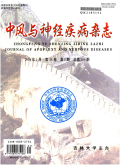中风与神经疾病杂志2024,Vol.41Issue(3):195-201,7.DOI:10.19845/j.cnki.zfysjjbzz.2024.0038
成人日间过度思睡与心血管健康的相关性研究
Association between excessive daytime sleepiness and cardiovascular health in adults
摘要
Abstract
Objective To investigate the association between excessive daytime sleepiness(EDS)and cardiovascu-lar health.Methods Data from the NHANES national representative database was used,and based on the EDS frequency questionnaire,the adults were divided into groups A,B,C,and D.The adults in group A had no daytime sleepiness(DS)group and chose the answer of"never",those in group B had mild DS and chose the answer of"rarely,sometimes(1-4 times a month)",those in group C had EDS and chose the answer of"often(5-15 times a month)",and those in group D had high-frequency EDS and chose the answer of"almost always(16-30 times a month)".The logistic regression analysis was used to estimate the degree of association of EDS with cardiovascular risk factors(hypertension,diabetes,hypercholesterolemia,and obesity)and cardiovascular event outcomes(including coronary artery disease,congestive heart failure,and stroke).Result This study included 12 786 unweighted participants from the four NHANES study periods of 2005-2008 and 2015-2018.Compared with the adults without DS,the adults with high-frequency EDS had a significantly higher proportion of the adults with a young age,female sex,a high body mass index,abdominal obesity,smoking,drinking,obstructive sleep apnea,sleep duration<6 hours,existing sleep problems,or a comorbidity of depression.The logistic regression analysis showed that high-frequency EDS was an independent risk factor for coronary artery disease(OR=1.02,95%CI 1.00-1.04,P= 0.044)and stroke(OR=1.02,95%CI 1.00-1.03,P=0.031).Conclusion High-frequency EDS is an independent risk factor for coronary artery disease and stroke.EDS should be taken seriously in clinical practice,and cardiovascular health man-agement should be strengthened for EDS patients.关键词
日间过度思睡/心血管健康/美国国家健康与营养调查数据库Key words
Excessive daytime sleepiness/Cardiovascular health/National Health and Nutrition Examination Survey分类
医药卫生引用本文复制引用
薛盛文,程金湘,刘宇航,张丽萍,赵显超,王怡,宿长军..成人日间过度思睡与心血管健康的相关性研究[J].中风与神经疾病杂志,2024,41(3):195-201,7.基金项目
国家自然科学基金项目(82200103) (82200103)
"睡眠-觉醒障碍治疗新方案研究"项目(2021YFC2501405) (2021YFC2501405)

